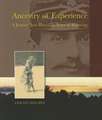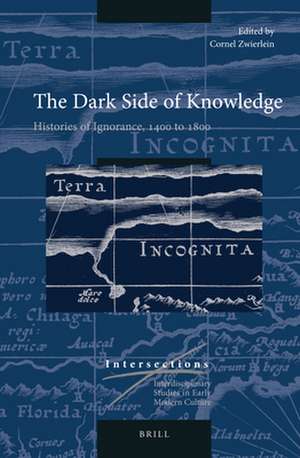The Dark Side of Knowledge: Histories of Ignorance, 1400 to 1800: Intersections, cartea 46
Autor Cornel Zwierleinen Limba Engleză Hardback – 22 iun 2016
Contributors: Giovanni Ceccarelli, Taylor Cowdery, Lucile Haguet, John T. Hamilton, Lucian Hölscher, Moritz Isenmann, Adam J. Kosto, Marie-Laure Legay, Andrew McKenzie-McHarg, Fabrice Micallef, William T. O´Reilly, Eleonora Rohland, Mathias Schmoeckel, Daniel L. Smail, Govind P. Sreenivasan, and Cornel Zwierlein.
Din seria Intersections
-
 Preț: 215.61 lei
Preț: 215.61 lei -
 Preț: 200.26 lei
Preț: 200.26 lei -
 Preț: 154.86 lei
Preț: 154.86 lei -
 Preț: 192.18 lei
Preț: 192.18 lei -
 Preț: 98.61 lei
Preț: 98.61 lei -
 Preț: 217.51 lei
Preț: 217.51 lei -
 Preț: 116.09 lei
Preț: 116.09 lei - 18%
 Preț: 1074.49 lei
Preț: 1074.49 lei -
 Preț: 241.64 lei
Preț: 241.64 lei -
 Preț: 241.64 lei
Preț: 241.64 lei -
 Preț: 228.96 lei
Preț: 228.96 lei -
 Preț: 229.55 lei
Preț: 229.55 lei -
 Preț: 241.64 lei
Preț: 241.64 lei -
 Preț: 226.67 lei
Preț: 226.67 lei -
 Preț: 107.21 lei
Preț: 107.21 lei -
 Preț: 208.79 lei
Preț: 208.79 lei -
 Preț: 201.78 lei
Preț: 201.78 lei -
 Preț: 226.85 lei
Preț: 226.85 lei -
 Preț: 225.71 lei
Preț: 225.71 lei -
 Preț: 246.63 lei
Preț: 246.63 lei -
 Preț: 228.96 lei
Preț: 228.96 lei - 47%
 Preț: 319.92 lei
Preț: 319.92 lei - 7%
 Preț: 315.66 lei
Preț: 315.66 lei -
 Preț: 96.10 lei
Preț: 96.10 lei - 18%
 Preț: 1201.75 lei
Preț: 1201.75 lei - 18%
 Preț: 659.69 lei
Preț: 659.69 lei - 18%
 Preț: 693.26 lei
Preț: 693.26 lei - 18%
 Preț: 1049.43 lei
Preț: 1049.43 lei - 18%
 Preț: 698.32 lei
Preț: 698.32 lei - 18%
 Preț: 681.99 lei
Preț: 681.99 lei - 18%
 Preț: 687.25 lei
Preț: 687.25 lei - 18%
 Preț: 820.59 lei
Preț: 820.59 lei - 18%
 Preț: 683.37 lei
Preț: 683.37 lei - 18%
 Preț: 667.86 lei
Preț: 667.86 lei
Preț: 1002.10 lei
Preț vechi: 2955.72 lei
-66% Nou
Puncte Express: 1503
Preț estimativ în valută:
191.75€ • 200.74$ • 158.66£
191.75€ • 200.74$ • 158.66£
Carte indisponibilă temporar
Doresc să fiu notificat când acest titlu va fi disponibil:
Se trimite...
Preluare comenzi: 021 569.72.76
Specificații
ISBN-13: 9789004325128
ISBN-10: 9004325123
Dimensiuni: 155 x 235 x 31 mm
Greutate: 0.82 kg
Editura: Brill
Colecția Brill
Seria Intersections
ISBN-10: 9004325123
Dimensiuni: 155 x 235 x 31 mm
Greutate: 0.82 kg
Editura: Brill
Colecția Brill
Seria Intersections
Notă biografică
Prof. Dr. Cornel Zwierlein, since 2008 Univ. Bochum, PhD 2003 LMU Munich/CESR Tours; Fellow Harvard History 2013-2016. Monographs Discorso und Lex Dei, 2006; Der gezähmte Prometheus, 2011; forthcoming The Political Thought of the French League (Droz, Geneva) and Imperial Unknowns (Cambridge UP).
Recenzii
"Our ignorance, [Zwierlein] notes, can take different forms. “Nescience” or “unspecified ignorance” names a condition in which we are unaware of what we don’t know; we are, in other words, ignorant of our ignorance. Unspecified ignorance transforms into “specified ignorance” as we become aware of things we don’t know. Ignorance can be willful or accidental, the product of censorship or planned political coercion. However it exists, Zwierlein contends that attention to the existence and role of ignorance in bureaucratic, economic, scientific, and artistic settings will deepen our understanding of knowledge production in the early modern world." - Dallas Denery, Bowdoin College, in: Renaissance Quarterly LXX.4
"Mehr Wissen erzeugt immer zugleich mehr Nichtwissen. Absolutes Nichtwissen – „unknown unknowns“, also das, wovon man nicht weiß, dass man es nicht weiß – lässt sich nicht thematisieren. Spezifisches Nichtwissen – „known unknowns“, also das, wovon man weiß, dass man es nicht weiß – hingegen schon. Nichtwissen lässt sich nur identifizieren, insofern es sich auf ein Wissen bezieht: das Allwissen Gottes, das Wissen der anderen, das zukünftige oder das vergangene Wissen, das verbotene, das unterdrückte, das verdrängte, das verlorene Wissen usw. Jedes Wissen definiert ja zugleich seine Grenzen und zeigt an, was noch nicht oder nicht mehr zugänglich ist." - Barbara Stollberg-Rilinger, Münster / Berlin, in: Zeitschrift für Historische Forschung 46.3
"Mehr Wissen erzeugt immer zugleich mehr Nichtwissen. Absolutes Nichtwissen – „unknown unknowns“, also das, wovon man nicht weiß, dass man es nicht weiß – lässt sich nicht thematisieren. Spezifisches Nichtwissen – „known unknowns“, also das, wovon man weiß, dass man es nicht weiß – hingegen schon. Nichtwissen lässt sich nur identifizieren, insofern es sich auf ein Wissen bezieht: das Allwissen Gottes, das Wissen der anderen, das zukünftige oder das vergangene Wissen, das verbotene, das unterdrückte, das verdrängte, das verlorene Wissen usw. Jedes Wissen definiert ja zugleich seine Grenzen und zeigt an, was noch nicht oder nicht mehr zugänglich ist." - Barbara Stollberg-Rilinger, Münster / Berlin, in: Zeitschrift für Historische Forschung 46.3
Cuprins
Notes on the Editor and the Contributors
List of Illustrations
Introduction: Towards a History of Ignorance
Cornel Zwierlein
PART 1: LAW
1 Law and the Uncertainty of Value in Late Medieval Marseille and Lucca
Daniel L. Smail
2 Nescience and the Conscience of Judges. An example of Religion’s influence on Legal procedure
Mathias Schmoeckel
3 Speaking Nothing to Power in early modern Germany: Making Sense of Peasant Silence in the Ius Commune
Govind P. Sreenivasan
PART 2: ECONOMY
4Coping with unkown Risks in Renaissance Florence: Insurance, Friars and Abacus Teachers
Giovanni Ceccarelli
5(Non-)Knowledge, Political Economy and Trade Policy in Seventeenth-Century France: The Problem of Trade Balances
Moritz Isenmann
6Ignorance in Europe’s State Financial Culture (Eighteenth Century)
Marie-Laure Legay
PART 3: SEMANTICS
7 Voluptas carnis. Allegory and Non-Knowledge in Pieter Aertsen’s Still-Life Paintings
John T. Hamilton
8Humanist Styles of Reading in the Prologues and Epilogues of William Caxton
Taylor Cowdery
9Coexistence and Ignorance: What Europeans in the Levant did not read (ca. 1620 to 1750)
Cornel Zwierlein
PART 4: POLITICAL AND SCIENTIFIC COMMUNICATION
10Ignorance about the Traveler: Documenting Safe Conduct in the European Middle Ages
Adam J. Kosto
11International Crises as Experience of Non-Knowledge: European Powers and the ‘Affairs of Provence’ (1589-1598)
Fabrice Micallef
12Dealing with Hurricanes and Mississippi Floods in Early French New Orleans. Environmental (Non-) Knowledge in a Colonial Context
Eleonora Rohland
13‘Unknown Sciences’ and Unknown Superiors. The Problem of Non-Knowledge in Eighteenth-Century Secret Societies
Andrew McKenzie-McHarg
14Specifying Ignorance in Eighteenth-Century Cartography, a powerful way to promote the Geographer’s Work: The example of Jean-Baptiste d’Anville
Lucile Haguet
PART 5: THEORY
15Semantics of the Void Empty Spaces in Eighteenth-Century German Historiography – A First Sketch of a Semiotic Theory
Lucian Hölscher
16Non-Knowledge and Decision Making: The Challenge for the Historian
William O’Reilly
Index nominum
Index rerum
List of Illustrations
Introduction: Towards a History of Ignorance
Cornel Zwierlein
PART 1: LAW
1 Law and the Uncertainty of Value in Late Medieval Marseille and Lucca
Daniel L. Smail
2 Nescience and the Conscience of Judges. An example of Religion’s influence on Legal procedure
Mathias Schmoeckel
3 Speaking Nothing to Power in early modern Germany: Making Sense of Peasant Silence in the Ius Commune
Govind P. Sreenivasan
PART 2: ECONOMY
4Coping with unkown Risks in Renaissance Florence: Insurance, Friars and Abacus Teachers
Giovanni Ceccarelli
5(Non-)Knowledge, Political Economy and Trade Policy in Seventeenth-Century France: The Problem of Trade Balances
Moritz Isenmann
6Ignorance in Europe’s State Financial Culture (Eighteenth Century)
Marie-Laure Legay
PART 3: SEMANTICS
7 Voluptas carnis. Allegory and Non-Knowledge in Pieter Aertsen’s Still-Life Paintings
John T. Hamilton
8Humanist Styles of Reading in the Prologues and Epilogues of William Caxton
Taylor Cowdery
9Coexistence and Ignorance: What Europeans in the Levant did not read (ca. 1620 to 1750)
Cornel Zwierlein
PART 4: POLITICAL AND SCIENTIFIC COMMUNICATION
10Ignorance about the Traveler: Documenting Safe Conduct in the European Middle Ages
Adam J. Kosto
11International Crises as Experience of Non-Knowledge: European Powers and the ‘Affairs of Provence’ (1589-1598)
Fabrice Micallef
12Dealing with Hurricanes and Mississippi Floods in Early French New Orleans. Environmental (Non-) Knowledge in a Colonial Context
Eleonora Rohland
13‘Unknown Sciences’ and Unknown Superiors. The Problem of Non-Knowledge in Eighteenth-Century Secret Societies
Andrew McKenzie-McHarg
14Specifying Ignorance in Eighteenth-Century Cartography, a powerful way to promote the Geographer’s Work: The example of Jean-Baptiste d’Anville
Lucile Haguet
PART 5: THEORY
15Semantics of the Void Empty Spaces in Eighteenth-Century German Historiography – A First Sketch of a Semiotic Theory
Lucian Hölscher
16Non-Knowledge and Decision Making: The Challenge for the Historian
William O’Reilly
Index nominum
Index rerum
